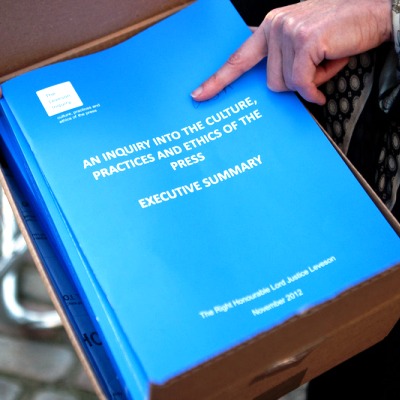
Martin Moore of the Media Standards Trust has written a long article for the New Statesman on the “topsy-turvy” world of the debate on press regulation and restrictions.
Moore undoubtedly makes some good points about the absurdity of some newspapers protesting potential political interference in the press while not raising a even the mildest objection to the government and secret services actual threats to the Guardian over its coverage of GCHQ surveillance techniques (similar points were made with elan by the Spectator’s Nick Cohen a few weeks ago).
The MST director berates newspapers for having “got the debate the wrong way round” both “in principle and in practice”.
But Moore and his comrades who support the Royal Charter, in the Media Standards Trust, Hacked Off, and individuals, themselves must take some blame for the topsy-turviness of the language around regulation.
Take the idea of “exemplary damages”, which, it is proposed, publications that do not sign up to a recognised regulator will be subjected to.
The pro-Royal Charter argument has been that the existence of exemplary damages, and the avoidance of them are “incentives” to join the regulator. They are not. They are a punishment for not joining the regulator. An incentive would suggest putting publications at an advantage; but under the current proposals, all that joining a regulator does is to put publications on a level footing with individuals or organisations who would not be considered subject to the regulatory scheme. An “incentive” to avoid default punishment is akin to a threat from a protection racket.
Further on in his article, Moore calls for a British version of the US’s First Amendment. It’s a nice idea.
But Moore says that Lord Justice Leveson proposed a British First Amendment. This is not the case.
What Leveson recommended was this:
In passing legislation to identify the legitimate requirements to be met by an independent regulator organised by the press, and to provide for a process of recognition and review of whether those requirements are and continue to be met, the law should also place an explicit duty on the Government to uphold and protect the freedom of the press.”
At first glance, that’s all very lovely. But it is meaningless at best, dangerous at worst, and certainly not a First Amendment style law.
Meaningless because all sorts of countries have constitutional guarantees of a free press. China, for example, states in article 35 of its constitution that “Citizens of the People’s Republic of China enjoy freedom of speech, of the press, of assembly, of association, of procession and of demonstration.” Fine words.
Dangerous as it could imply that the government of the day ultimately holds press freedom in its hands. This, it may be argued, is the case anyway, but to explicitly say it is not ideal. As noted in a recent Huffington Post article by Hacked Off’s Brian Cathcart, the British government has made many attempts in the past to stifle press freedom. I don’t really see why we should explicitly say the concept belongs to them.
The first amendment states simply:
Congress shall make no law respecting an establishment of religion, or prohibiting the free exercise thereof; or abridging the freedom of speech, or of the press; or the right of the people peaceably to assemble, and to petition the Government for a redress of grievances.”
To claim that Leveson’s proposal, specifically to create a law about freedom of the press, is the same thing, is odd. When coupled with the proposal of punitive measures for those publishers who do not wish to play the government’s game, the claim is absurd.
This article was originally posted on 26 Nov 2013 at indexoncensorhip.org




